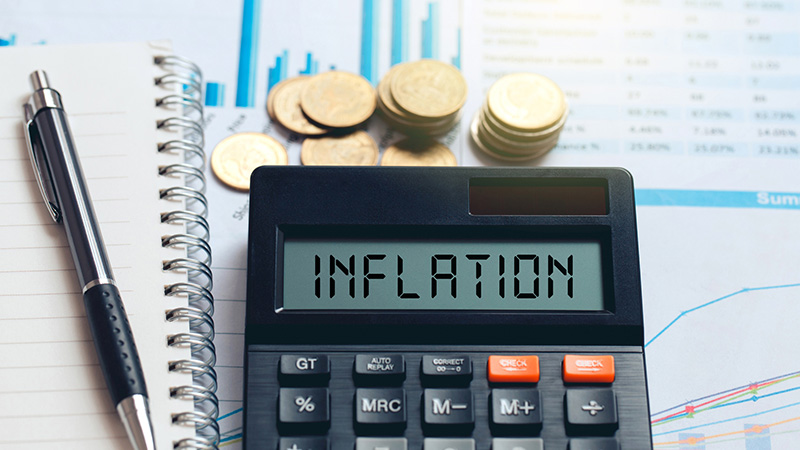
This content is for information and inspiration purposes only. It should not be taken as financial or investment advice. To receive personalised, regulated financial advice please consult us here at Elmfield Financial Planning in Padiham, Burnley, Lancashire.
The Bank of England (BoE) has raised the base rate four times in six months. With inflation now standing at 9%, some analysts believe further rises may be on the horizon. Rising interest rates have multiple effects on the economy and household finances. However, they can also have an impact on stock markets. Below, our team at Elmfield Financial Planning in Padiham, Burnley, Lancashire explains how interest rates and inflation interact, and how the former can affect the wider stock market. We conclude with a reminder to stay calm, stay invested and to trust in the long-term strategy agreed with your financial planner.
How do interest rates work?
The base rate is controlled by the BoE and determines the cost of borrowing for the UK government (e.g. to pay for public services not covered by tax revenues). Other banks then set their own interest rates according to the base rate. If the base rate is 1%, for instance, then a high street bank might set its interest rate at 1% above this when lending to customers. Usually, this also leads to a rate rise offered by regular savings accounts (although not always; as has happened recently). This, in turn, typically encourages people to save more.
Understanding these dynamics help to show how inflation is affected by interest rates (and, in turn, stock markets). If interest rates go up, then consumer spending in the economy should – theoretically – go down as more people chase the higher saving rates offered by banks. Since inflation, broadly defined, refers to the overall rise in cost for goods and services in an economy, this rise in interest rates acts as a “cooling effect” on inflation – helping to keep prices under control, so they do not become unaffordable.
However, this does not always work in practice. Recently, for instance, the BoE has raised the base rate several times to try and control inflation (now standing at a 40-year high of 9%). Yet the cost of living has continued to rise dramatically. The Governor of the BoE has stated that 80% of the factors driving inflation lie overseas, and so cannot be controlled by central bank policy. Unfortunately, this now means that, in mid-2022, living costs are running high and also mortgage rates are going up (as banks raise their own rates).
How does this affect the stock market?
Rising inflation and interest rates can also bring bad news for publicly-listed companies and their shareholders. The former means an increase in “input costs” for businesses such as raw materials used to make products, or higher logistics costs (due to increased fuel prices as the goods are driven by lorries to different retailers). This typically means less profit to invest back into the company and encourage growth; or, less profit to distribute amongst shareholders as dividends. However, if interest rates go up, this can also act as downward pressure on shares.
When the base rate rises, the cost of borrowing increases – not just for the government, but also for companies looking to use debt to grow their business. Again, this eats into profits. However, interest rates also indirectly affect the stock markets by making bonds (e.g. UK government bonds, or “gilts”) more attractive to investors. This is because newly-issued bonds now offer a higher interest rate (profit) to investors. For those looking for a “safer” investment than volatile company shares, bonds can become a better option – leading to an equity sell-off, which drives share prices down. If the base rate goes higher enough, this could lead to a “bear market” (i.e. stock market drop of 20% or more).
What should I do with my shares?
At this point, some readers may be concerned about the investments. What if the base rate goes even higher and the market crashes? Should I pull out my money now? However, it is vital to not try and “time the market” in this way. Remember, few people can predict the stock market accurately and consistently – even professional fund managers.
For those with a financial planner, it is also important to remember that you crafted your portfolio together with these risks in mind – ahead of time. You would have discussed questions about your “risk appetite” (e.g. “How would you feel if your portfolio fell by 20% in one day?”) and other key factors when choosing your investments – such as how long until you needed the money.
As such, those with a long “investment horizon” in front of them (e.g. young professional investing for retirement) will likely have plenty of time for their portfolio to recover from (and surpass) a possible bear market in the next year or so. Those looking to access their funds in the coming years – such as those preparing for retirement – will likely have already started “de-risking” their portfolio as their target date approaches (e.g. moving more of the portfolio into “safer” assets, such as fixed-income securities).
All of this is to say – try not to panic about headlines regarding inflation and interest rates. If you are worried, speak to your financial planner. He/she can act as your “sounding board” and help point you back to your strategy, as well as the time-honoured investment principles that will give you the best chance of achieving your financial goals.
Invitation
If you are interested in starting a conversation about your own financial plan or investments, then we’d love to hear from you. Please contact us to arrange a free, no-commitment consultation with a member of our team here at Elmfield Financial Planning in Padiham, Burnley, Lancashire.
Reach us via:
T: 01282 772938

